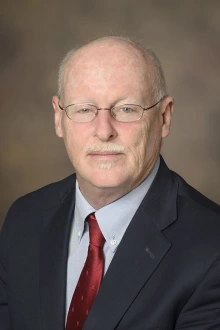Dr. David Harris Honored for Role in COVID-19 Response
David Harris, PhD, MS, University of Arizona College of Medicine – Tucson professor of immunobiology and director of the UArizona Health Sciences Biorepository, has received a 2021 Leader of the Year award in the COVID-19 Response & Management category from the Arizona Capitol Times.
“The recognition of the work that we have been able to do in this arena is the recognition of our team, not just one individual,” Dr. Harris said. “When we started this work, we shifted our daily efforts to emphasize collecting and biobanking samples from infected individuals to better understand the pandemic and its seriousness.”

David Harris, PhD, MS
At the outset of the COVID-19 crisis in Arizona, Dr. Harris was quick to respond, heading a team at the Biorepository that created tens of thousands of test kits to address a severe shortage. Starting in February 2020, the university’s sample collection kits expanded the availability of testing for suspected COVID-19 cases and helped researchers understand the reach of the virus in Arizona. The lab produced thousands of PCR test kits per week until May 2020, when testing became more easily accessible.
Later, his lab validated and implemented a rapid antigen test, which was used on campus for faculty, staff, athletes and students. From May 2020 to May 2021, campus officials tested more than 250,000 individuals, often several thousand per day. The ability to test easily and often helped the university drop its infection rate from 17% in the beginning of the pandemic to less than 1% by early 2021.
“Our proudest moments during the pandemic were seeing the effects of easy and frequent testing on the infection rate in the campus community,” Dr. Harris said. “Our efforts also allowed the University of Arizona to be the only school in the PAC-12 not to cancel a football or basketball game or any other sport due to infected athletes.”
By early 2021, when the COVID-19 vaccines were rolling out to the general public, Dr. Harris was integral in ensuring they were properly received, stored, prepared and distributed at the state-run University of Arizona Point of Distribution (POD) for Pima County. Along with Michael Badowski, PhD, associate research scientist at the College of Medicine – Tucson, he oversaw the “freezer farm,” where thousands of doses of the vaccines could be stored at a time. The University of Arizona POD administered more than 260,000 vaccine doses from January to June 2021.
“We were flexible enough that we could contribute to the vaccination efforts as time went on,” Dr. Harris said. “Our team has seen so many become ill and has personally experienced loss that we are constantly reminded that there is no way to end the pandemic without the participation of everyone. Until we reach herd immunity, there will always be a possibility of a new and more deadly variant that could put us back at the beginning. My team will be there to assist in the identification and testing of any new such variants, but without a united effort to mitigate virus spread we will constantly be at risk of losing the battle.”
Dr. Harris, who also is a member of the BIO5 Institute, joined the Health Sciences faculty in 1989. In 1992, he established the first cord blood bank in the United States. His research interests include stem cells and regenerative medicine, cancer research/stem cell transplantation and gene therapy. Dr. Harris has founded five companies while at Health Sciences: Cord Blood Registry, Inc.; ImmuneRegen BioSciences, Inc.; QuReGen, Inc.; AdiCyte and Family Cryo Bank.
The 15th annual awards ceremony, held Sept. 28 in Phoenix, honored individuals and organizations for their professional and civic involvement. The Arizona Capitol Times had previously highlighted Arizona’s three public universities for their pandemic response, applauding Dr. Harris for his work leading the team that ultimately produced more than 35,000 PCR COVID-19 test kits, which were sent at no cost to health care providers across Arizona, including in rural and tribal communities.

